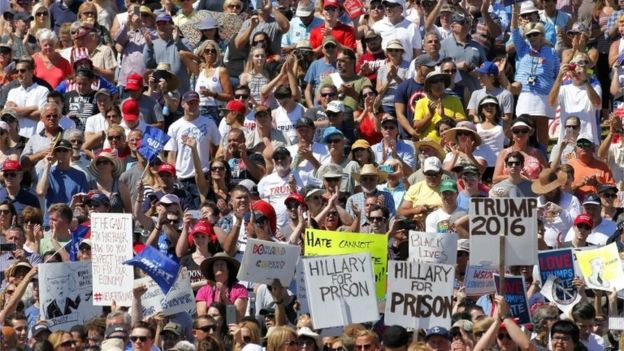Demonstrators blocked a highway in Arizona as Donald Trump prepared to stage a rally near Phoenix.
The front-runner in the race to be the Republicans' US presidential candidate addressed supporters in Fountain Hills.
Some 50 protesters caused traffic jams as they held up posters with slogans such as "Dump Trump".
The billionaire's rallies have been marred by a series of recent incidents. A meeting in Chicago a week ago was cancelled after protests.
Hundreds of demonstrators had gathered at the University of Illinois and fighting broke out between supporters and protesters in the auditorium where Mr Trump was due to speak.
Criticism over violent Trump rallies
What Trump says about protesters at his rallies
Why are Americans so angry?
In the latest disturbance, protesters marched down the highway leading to Fountain Hills. Police made several arrests before the demonstrators dispersed.
Some, heavily outnumbered by Trump supporters, made their way to the edge of the rally venue in Fountain Park.
Speaking later at the rally, Mr Trump described the protesters as "disgraceful" and said they were "representing [Democratic front-runner] Hillary Clinton".Demonstrators blocked a highway in Arizona as Donald Trump prepared to stage a rally near Phoenix.
The front-runner in the race to be the Republicans' US presidential candidate addressed supporters in Fountain Hills.
Some 50 protesters caused traffic jams as they held up posters with slogans such as "Dump Trump".
The billionaire's rallies have been marred by a series of recent incidents. A meeting in Chicago a week ago was cancelled after protests.
Hundreds of demonstrators had gathered at the University of Illinois and fighting broke out between supporters and protesters in the auditorium where Mr Trump was due to speak.
In the latest disturbance, protesters marched down the highway leading to Fountain Hills. Police made several arrests before the demonstrators dispersed.
Some, heavily outnumbered by Trump supporters, made their way to the edge of the rally venue in Fountain Park.
Speaking later at the rally, Mr Trump described the protesters as "disgraceful" and said they were "representing [Democratic front-runner] Hillary Clinton".


In Mr Trump's home city of New York, several hundred protesters gathered outside Trump Tower in Manhattan.
Some chanted slogans accusing him of racism, sexism and being anti-gay. The gathering included immigrants' rights activists and socialists.
Several protesters carrying "Vote Trump" placards were also present, explaining that they wanted to demonstrate their right to support Mr Trump.

On 12 March, a man tried to rush Mr Trump as he spoke on stage in Ohio but was prevented from doing so by Secret Service agents.
A Trump supporter was also charged with assault after multiple videos showed him punching a protester at a campaign rally in North Carolina.
Mr Trump has been accused of creating tension through divisive rhetoric, but he denies using hate speech or playing any part in fostering division.
The Arizona rally was the Republican hopeful's second visit to the state in three months. A primary takes place there on 22 March.
Mr Trump and Mrs Clinton strengthened their leads in a series of primaries last Tuesday.

